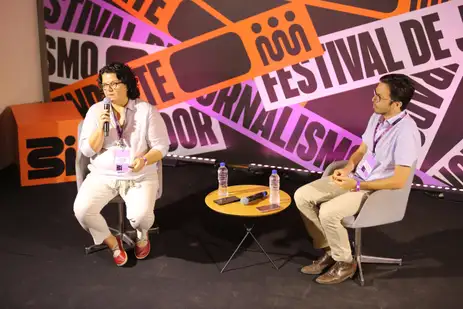A series of organizations that rely on journalism as a tool for social transformation have been challenging concepts considered traditional. This is what a study developed by researcher Nina Weingrill (featured photo), a master’s student at Fundação Getulio Vargas (FGV) and member of the International Center for Journalists (ICFJ), an organization based in the United States that develops actions and programs to promote journalism, points out. .
She explains that they are organizations that adopt premises aligned with a theory of change. In this sense, they move away from the discourses adopted by traditional media companies, which often claim, for example, the impartiality of their coverage. “It involves the idea that journalism is a driving force to achieve specific results. It is not an end in itself. It is an instrument for transformation. These organizations understand that they are driving transformation in their communities.”
The preliminary results of the research were presented during the 3i Festival, in Rio de Janeiro. The event, held by the Digital Journalism Association (Ajor), began on Thursday (13) and ends this Saturday (15). Held since 2017, the meeting dedicated to various topics involving journalism reached its fourth edition. The program brings together experts at debate tables, workshopsworkshops and other activities.
With a professional career focused on promoting and studying diversity in journalism, Nina says that the research proposal arose from a discomfort. “They said to me: ‘How cool are you doing citizen journalism’. No problem with that terminology. It turns out that this is always seen as something smaller and different from, in quotation marks, professional journalism,” she says.
She chose to designate the work of these organizations using another term: civic media. According to the researcher, this is a movement that is advancing in Latin America, but is already consolidated in the United States. Although she intends to develop a specific investigation into Brazil, the current study sought to understand the phenomenon based on the reality of North Americans. Between July and September 2023, 18 leaders from these organizations were interviewed. The full results will still be published.
According to preliminary data presented at Festival 3i, the term “impact” appeared 72 times throughout the interviews, even surpassing the term “journalism” and only behind the term “community”. “It’s a very essential thing for these organizations, which clashes with some concepts of traditional journalism. They are very clear that they are seeking social transformation. From then on, it is understood that the work is not just about informing. It’s not enough for me to put on the networks or print the newspaper. Furthermore, it has an impact. And you need to look for that impact to see that policy change, for something to happen”, he says.
Nina assesses that civic media is a growing new media ecosystem and defines it as “forms of communication that strengthen social ties within a community or that create a strong sense of civic engagement among its residents.” According to her, organizations aim to stimulate transformations that include political and social changes, changes in narratives and increased civic participation. They offer community media training programs to train producers and readers, as well as encourage and support local civic action through the production, distribution and consumption of reliable information that shares values, ethics and internal practices that promote democracy.
According to the research, these organizations generally act based on criteria such as encouraging the resolution of community problems, democratic deliberation and political engagement; the search to fill information gaps in rural or low-income communities; and the incorporation of measures to guarantee equity. Furthermore, they adopt consistent participatory media practices, through community listening mechanisms that may include holding open meetings and creating advisory councils.
Nina observes that there is also a concern with the ways to measure the impact, which is a challenge: the majority of interviewees expressed dissatisfaction with the current methods. “Despite being dissatisfied, they have measurement systems. It’s a characteristic of these organizations in the United States. I think we still see very little of this here in Brazil. There are few Brazilian organizations that have systems that allow them to measure the results of what they are doing.”
According to the researcher, this issue is also related to financing. All organizations in the United States with budgets exceeding US$3 million annually have an impact tracker, which suggests that this is a demand from funders or a strategy used to attract supporters and raise more resources.
Gaps
During the 3i Festival, data on the evolution of communication research in the country was also presented. The president of the Brazilian Society for Interdisciplinary Communication Studies (Intercom), Juliano Domingues, presented a survey carried out based on the bank of theses and dissertations of the Coordination for the Improvement of Higher Education Personnel (Capes), an entity linked to the Ministry of Education (MEC ). From 1987 to 2022, 17,315 master’s degrees and 5,641 doctorates were completed in the country.
According to Domingues, the main emerging themes in communication research involve advances in digital technologies, disinformation and fake news, public health communication and inclusive communication. When it comes to specific studies on journalism, he mentions data journalism, financial sustainability, ethics and public engagement as subjects that have seen an increase in interest.
An analysis of the main gaps in research in the area was presented by Carol Monteiro, director of the School of Communication at the Catholic University of Pernambuco (Unicap) and president of Ajor, the event’s host organization, “Although there are isolated case studies of vehicles involving sustainability and business models, there is a lack of more comprehensive studies on the values and characteristics of the digital journalism industry”, he assessed.
Carol Monteiro also considers that there is a lack of research involving digital security for journalists, given the increase in cyber attacks and threats online. She also sees the need to further explore the impact of artificial intelligence on journalism, as well as diversity issues and legal and regulatory changes affecting digital journalism.



